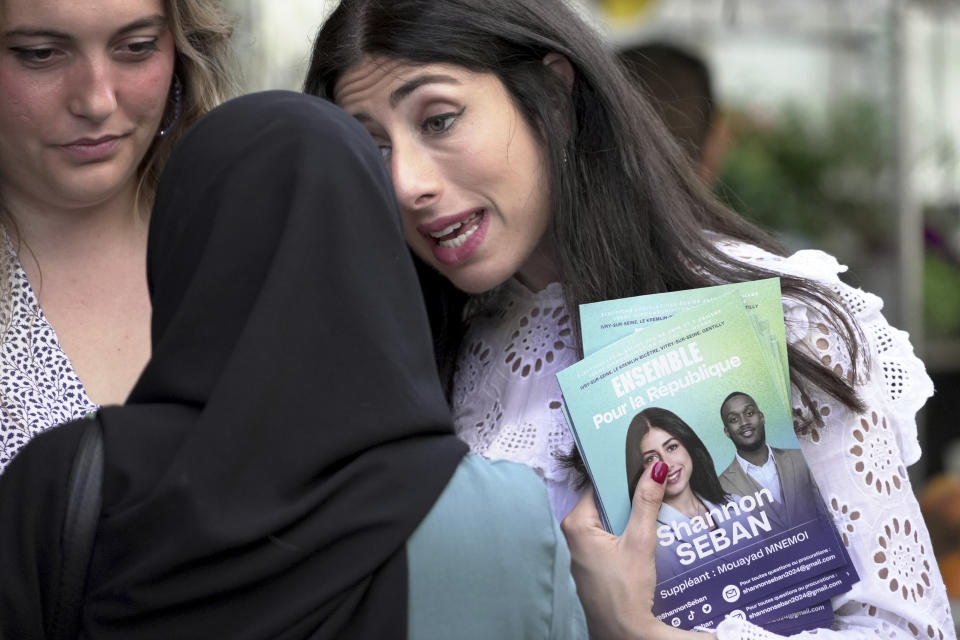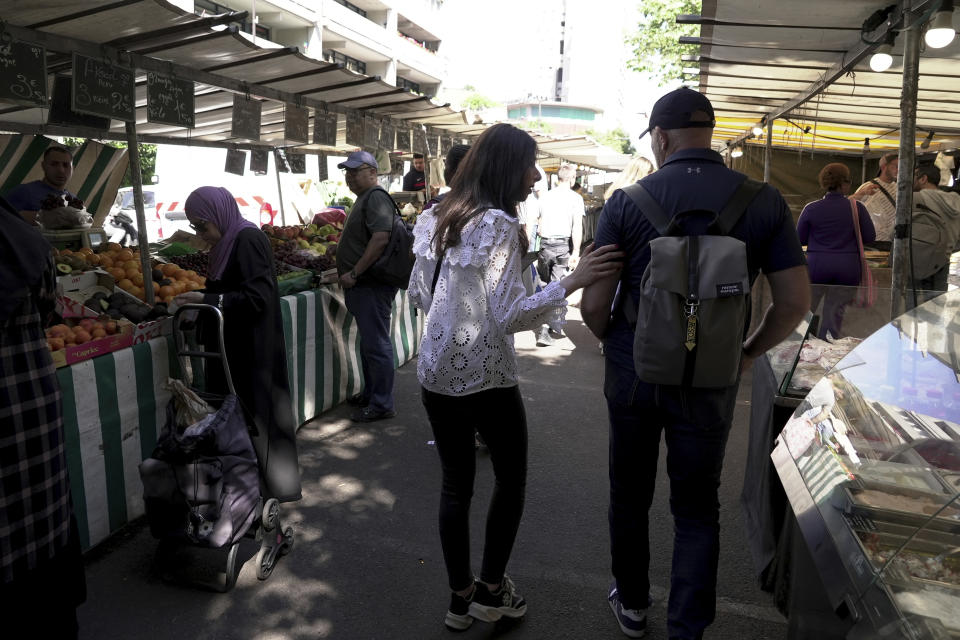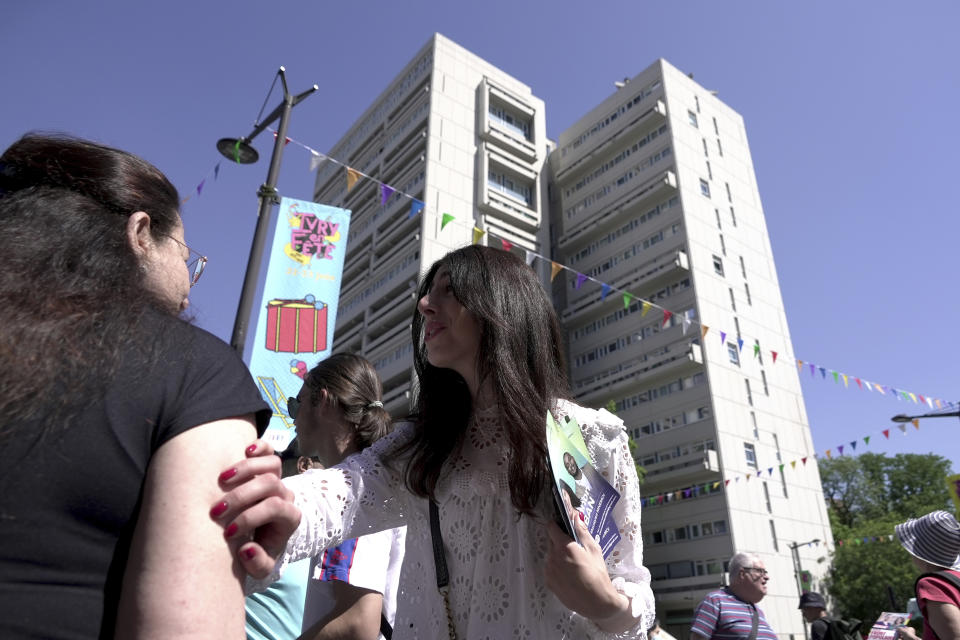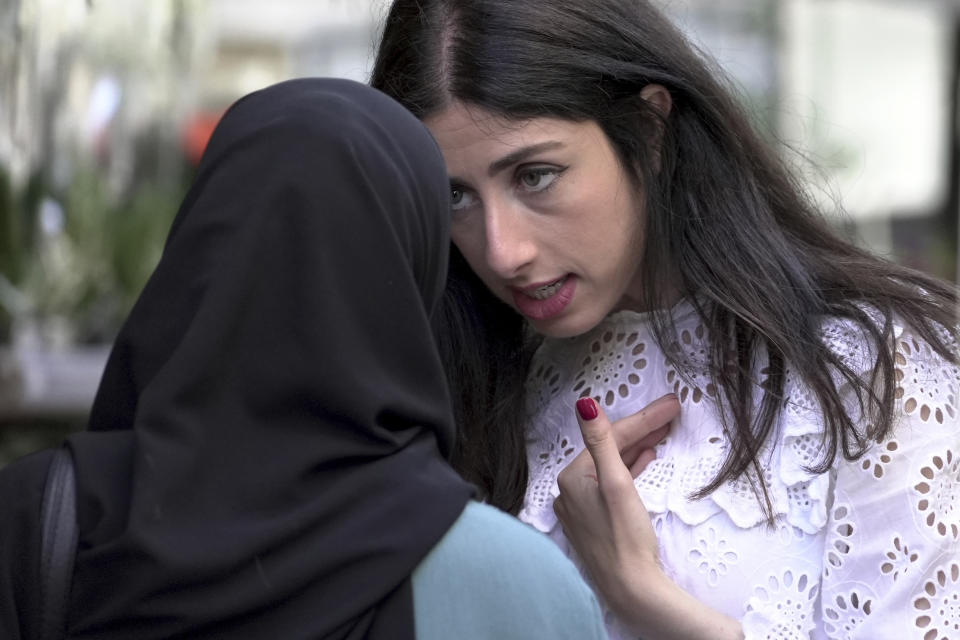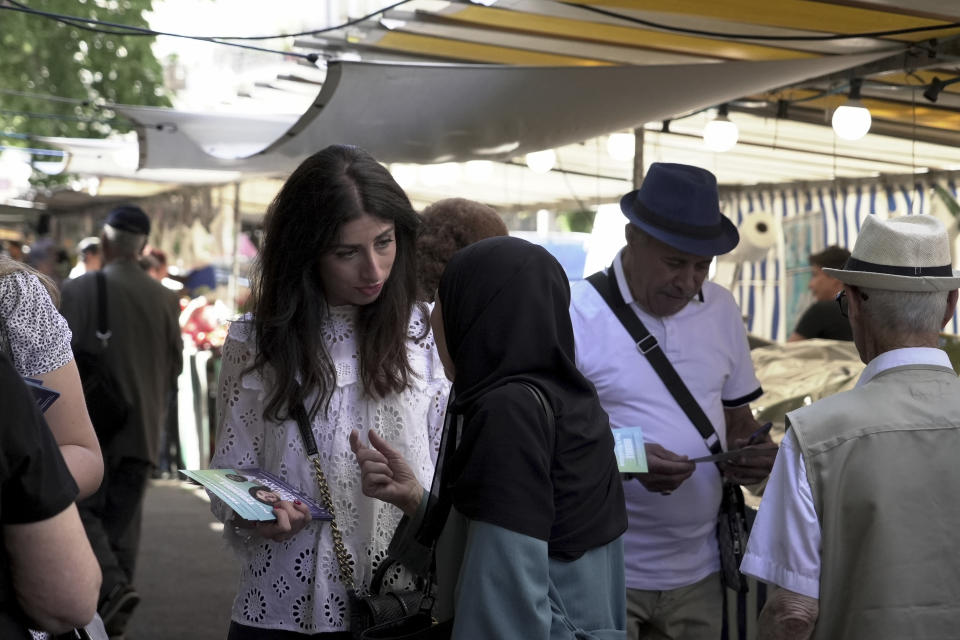In France's high-stakes legislative election, a Jewish candidate faces and fights hate and division
IVRY-SUR-SEINE, France (AP) — Amid market stalls heaped with fresh foods, the shopper walked past the young candidate campaigning for votes in France's high-stakes and torrid legislative election but then paused and doubled back to give Shannon Seban a piece of her mind.
What happened next is becoming depressingly familiar for the 28-year-old candidate, who is Jewish and says she's increasingly on the receiving end of antisemitism that has surged as a hot-button issue in the campaign. Seban's heated exchange with the shopper in the Paris suburb of Ivry-sur-Seine this week before Sunday's first round of voting appeared to bear out her concerns.
The woman accused Seban of being a Zionist, which the candidate took as an insult. She then brought up Seban's Jewish faith, which further riled the prospective lawmaker because she regards her religion as nobody's business but her own.
Both of them increasingly angry, the shopper upped the temperature by saying to Seban: “There’s no place for you here." She then wheeled away and melted back into the crowd, muttering “you’re a Zionist” like a curse as she did so.
“To tell me I have no right to be here is unacceptable,” Seban, who was born in the Paris suburbs, shouted after her. The woman yelled back: “Aren't you ashamed to be here?”
Although the roughly half-million people of Jewish faith make up only a small portion of mainland France's 66 million inhabitants, they have unwittingly been thrust into the electoral fray by the country's bitter divisions over the Hamas-Israel war and a tinderbox of accusations of antisemitism that opposing camps in the legislative elections are hurling at each other.
Jewish voters are agonizing over how to choose in an election where the centrist camp of President Emmanuel Macron is bracing for another possible beating by the far-right National Rally — after it surged in European parliament elections on June 9 — and by a new coalition of left-wing parties that coalesced to stave off the prospect of France's first far-right government since World War II.
Holocaust survivor and renowned Nazi hunter Serge Klarsfeld, whose father was deported to the Auschwitz death camp, never to return, provoked stupefaction in the campaign by declaring that in a run-off between far left and far right, he'd vote for the National Rally despite its historical links to antisemitism. Jean-Marie Le Pen, co-founder of the National Rally's forerunner, the National Front, has multiple convictions for racism and antisemitism, including for repeatedly saying that Nazi gas chambers were "a detail” of WWII history.
He was eventually expelled from the party as part of a makeover by his daughter and successor, Marine Le Pen, to make it palatable to mainstream voters.
Speaking to French broadcaster LCI, Klarsfeld said that, in his eyes, the National Rally has transformed and “supports Jews, supports the state of Israel." Klarsfeld added that he regards the left-wing coalition's largest component, the far-left France Unbowed party, as being tinged with antisemitism and “violent ant-Zionism.”
France Unbowed leaders have staunchly condemned the conduct of Israel's war against Hamas and accused it of pursuing genocide against Palestinians. But they have repeatedly and strongly denied accusations of antisemitism. The left-wing coalition's campaign manifesto says: “Antisemitism has a tragic history in our country that must not be repeated. All those who spread hatred of Jews must be fought.”
The manifesto notes that France's estimated 5 million Muslims are also targets of hatred. It pledges that, if elected, the coalition's government would propose plans to combat both antisemitism and Islamophobia.
The anti-immigration National Rally has long spoken out against what it argues is a creep of Muslim religious and cultural influences in France, often singling out Muslim women for wearing headscarves and drawing links with Islamist extremism. In a section titled “Preserving French civilization,” the National Rally's campaign manifesto promises legislation “targeting Islamist ideologies, a genuine totalitarian threat of modern times.”
The party also continues to face intense scrutiny over antisemitism. In this election, it initially disavowed one of its candidates in Brittany after the left-leaning newspaper Liberation reported that Joseph Martin posted “gas brought justice to the victims of the Shoah” in 2018 on what was then Twitter. The National Rally subsequently rehabilitated Martin after ruling that his post was taken out of context, said the party’s vice president, Louis Aliot. Brittany newspaper Le Telegramme quoted Martin as saying the “tweet was a tribute to victims of the Shoah.”
Seban, who is campaigning for Macron's centrist camp, describes both the far right and the left-wing coalition as “extreme” and says that "in power, it’s civil war in the country.”
“Far left, far right — for me, it’s a choice between the plague and cholera,” she said.
Contesting a seat in the Val-de-Marne region southeast of Paris, Seban is notably up against a France Unbowed leader, Mathilde Panot. Seban is pessimistic about her chances — Panot won with 68% of the vote in 2022 — but is battling on.
“Good morning, Madame,” she said as she thrust a leaflet into the hands of another market shopper. “We're counting on you Sunday to be a bulwark against the extremes. It's important.”
Attacks targeting French Jews, places of worship and Holocaust memorials have surged in the wake of Hamas’ Oct. 7 attack on Israel. Seban says she faced antisemitism before that. She spoke in an Associated Press interview of being the target of particularly hurtful verbal abuse that she said referenced her supposedly "murderous Jewish nose." But she says hatred has become particularly unrestrained since Oct. 7.
Three burly private security guards discreetly watched from a distance as Seban canvassed voters at the market and on Ivry's streets. She said her party assigned her the security detail out of fears for her safety after a hostile crowd confronted her on another stop in Ivry last Sunday.
“I was booed, hissed, heckled and, truly, I felt humiliated. At first, I stood firm. I said ‘No, I won’t leave. I have the right to be here as a citizen,” she recounted. “But as time went on, I saw that the crowd was starting to get bigger and bigger. The shouts were very loud: 'Get out, dirty Zionist ! You are not at home here! Get out, get out!'"
Finally and reluctantly, "I had to leave."
“Anti-Zionism today is the new face of antisemitism.” she said.
Seban initally had a running mate, Mouayad Mnemoi, who is Black. But he withdrew from the race almost immediately after suffering racist abuse online and threatening phone calls, she said. A photo Seban posted of the two of them together after they registered their candidacy drew lots of messages of support but also abusive comments referencing Mnemoi's skin color.
“It proves," she said, “that my fight is legitimate.”

